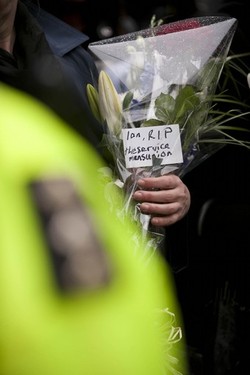Met hired lawyers to contest the findings of G20 protest inquiry
Scotland Yard's most senior officer in charge of policing protests saidtoday that he would support a government inspectorate which has proposed a radical overhaul of public order policing.
Assistant commissioner Chris Allison said police would in the future be "far more explicit" about their commitment to facilitating peaceful protest, the main proposal made in an inquiry headed by Denis O'Connor, the chief inspector of the constabulary.
O'Connor's inquiry was launched in the aftermath of the Metropolitan police's controversial handling of the G20 protests, which saw several thousand protesters contained by officers in so-called "kettles" near the Bank of England. A newspaper-vendor, Ian Tomlinson, died after being pushed by a member of the Met's territorial support group.

The full report by Her Majesty's Inspectorate of Constabulary (HMIC), outlining major reform for policing protests, will be published next month. However, the Guardian understands the Met hired lawyers to object to a central recommendation made in its interim findings.
HMIC sources said the Met instigated a "huge battle" with inspectors, who were attempting to bring the force's approach in line with human rights obligations to facilitate peaceful assembly. The HMIC was forced to pay for its own senior barrister, whose legal advice found in their favour.
A Home Office source said the Met was still resistant to change, and "the battle is far from won" over the right approach to demonstrations. Allison disputed that, saying that despite legal objections submitted during the drafting process, he was squarely behind the HMIC.
"We have signed up as an organisation," he said. "If you look at the way we policed Climate Camp in August, look at the way we policed many, many other events, we have recognised the proposals [made by O'Connor] and have embedded them into what we are doing."
He said lawyers were called in for "a discussion about where are the points of law on this". "The two sets of lawyers, and I wasn't sitting in the room at the time when the lawyers were talking this all through, were trying to ensure we had a common understanding.
"We had some very fruitful discussions that took place so that we all had a common understanding of the way forward. What we've done, by getting lawyers together, is recognise how we can get a better understanding of what the law says and what we should be doing as an organisation. As a result of that, a good HMIC report has come out."
However, HMIC sources said the Met's opposition led to a delay in the publication of its interim findings in July. "There was a huge battle about this," one source said.
"The Met wouldn't accept that wasn't the right starting point. If you define something as unlawful, you are going to police it in the wrong way. This was not a straightforward [case of] 'police accept it and on we go'."
O'Connor is understood to have been backed in the dispute by Sir Hugh Orde, the new president of the Association of Chief Police Officers. The HMIC human rights-centred approach is loosely-based on a model created by Orde in his former job as chief constable of the Police Service of Northern Ireland.
"Hugh Orde has been very positive, and has much more of a sense of the human rights approach," the source added. "He is more alive as to how all this works."
The Met is understood to have hired lawyers after the learning the HMIC would criticise the force's interpretation of public order legislation. The inspectors found its "unlawful" interpretation of G20 protests was inconsistent with article 11 of the European convention on human rights, which protects the right to peaceful assembly.
As a result of their legal analysis, senior officers had judged large crowds that had gathered in the City of London in April to be engaging in "unlawful protest". The inspectors also found that police had wrongly assumed that, because they had not been notified of marches around the G20 on 1 April, protesters taking part were breaking the law. The Met also judged that protesters gathering peacefully on roads had been obstructing the highway.
HMIC officials countered that police were in fact duty-bound to assess whether any disturbance caused by an obstruction was "unreasonable", given that protesters were simultaneously exercising their human rights to expression and assembly.
The final draft of the report found against the Met, stating: "The correct starting point is the presumption in favour of facilitating peaceful protest."
Source: http://www.guardian.co.uk/politics/2009/oct/26/met-police-g20-protest-inquiry



